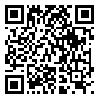Volume 6, Issue 1 (1-2019)
jbrms 2019, 6(1): 12-20 |
Back to browse issues page
Download citation:
BibTeX | RIS | EndNote | Medlars | ProCite | Reference Manager | RefWorks
Send citation to:



BibTeX | RIS | EndNote | Medlars | ProCite | Reference Manager | RefWorks
Send citation to:
Mahmoodi G, Amini S. The effect of Salvia officinalis hydroalcoholic extract on scopolamine-induced memory impairment in adult male mice. jbrms 2019; 6 (1) :12-20
URL: http://jbrms.medilam.ac.ir/article-1-379-en.html
URL: http://jbrms.medilam.ac.ir/article-1-379-en.html
Department of Biology, Kermanshah Branch, Islamic Azad University, Kermanshah, Iran , g.mahmoudi@iauksh.ac.ir
Abstract: (4665 Views)
Introduction: The role of medicinal plants in enhancement of memory and improvement of Alzheimer disease symptoms has attracted researchers’ attention. Genus Salvia (sage) is the largest and most valuable type of herbal medicine from Lamiaceae family, and its therapeutic effects have long been considered. This study investigated the effect of hydroalcoholic extract of Salvia officinalis (S. officinalis) leaves on scopolamine-induced amnesia in adult male mice.
Materials and methods: A step-through inhibitory avoidance task was used for memory assessment. Animals received hydroalcoholic extract of Salvia (10, 20 or 40 mg/kg) 30 minutes after administration of scopolamine (1 mg/kg, intraperitoneally) after training and before testing, (based on experimental design). Animals were tested 24 h after the training session, and step-through latency in entering the dark compartment was recorded as passive avoidance memory. The data were analyzed by one-way ANOVA, followed by Tukey test. Statistical significance level was set at P<0.05.
Results: The results indicated that administration of scopolamine impaired both consolidation and retrieval of passive avoidance memory. Administration of 40 mg/kg hydroalcoholic extract of Salvia after training, or 20 and 40 mg/kg on the day of experiment ameliorated the effect of scopolamine.
Conclusion: The hydroalcoholic extract of Salvia can inhibit scopolamine-induced impairment of passive avoidance memory in mice.
Materials and methods: A step-through inhibitory avoidance task was used for memory assessment. Animals received hydroalcoholic extract of Salvia (10, 20 or 40 mg/kg) 30 minutes after administration of scopolamine (1 mg/kg, intraperitoneally) after training and before testing, (based on experimental design). Animals were tested 24 h after the training session, and step-through latency in entering the dark compartment was recorded as passive avoidance memory. The data were analyzed by one-way ANOVA, followed by Tukey test. Statistical significance level was set at P<0.05.
Results: The results indicated that administration of scopolamine impaired both consolidation and retrieval of passive avoidance memory. Administration of 40 mg/kg hydroalcoholic extract of Salvia after training, or 20 and 40 mg/kg on the day of experiment ameliorated the effect of scopolamine.
Conclusion: The hydroalcoholic extract of Salvia can inhibit scopolamine-induced impairment of passive avoidance memory in mice.
Type of Study: Research |
Subject:
Physiology
Received: 2018/07/10 | Accepted: 2019/01/6 | Published: 2019/04/10
Received: 2018/07/10 | Accepted: 2019/01/6 | Published: 2019/04/10
Send email to the article author
| Rights and permissions | |
 |
This work is licensed under a Creative Commons Attribution-NonCommercial 4.0 International License. |





